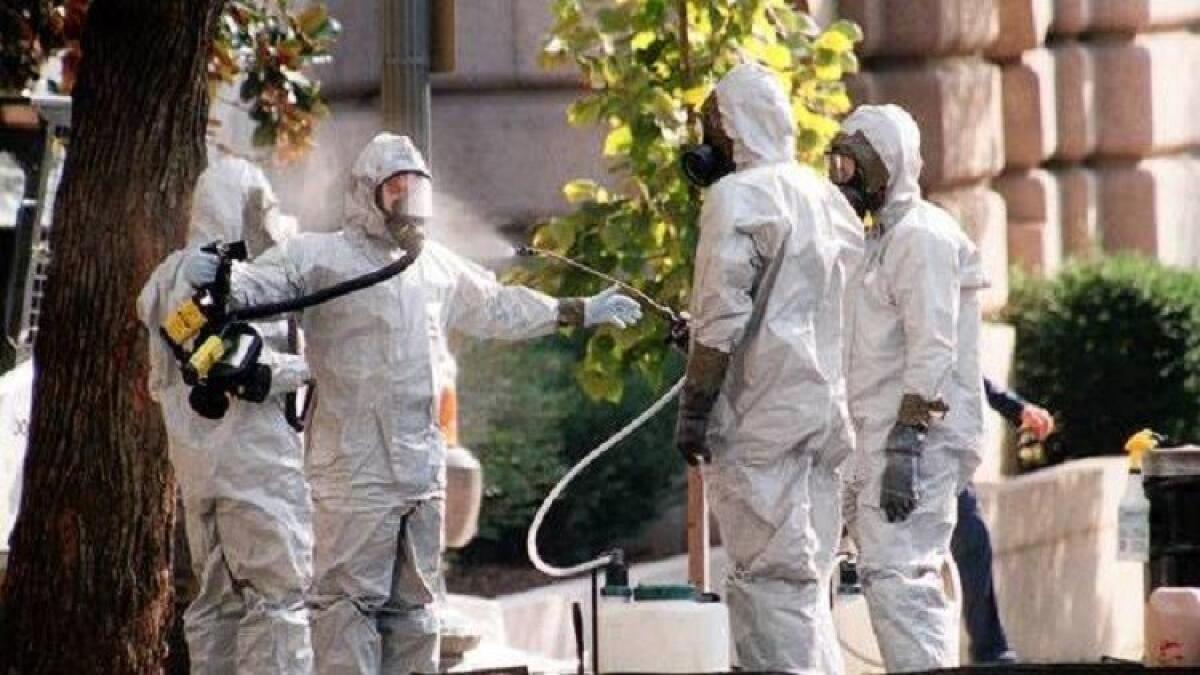Homeland Security’s cuts in counterterrorism programs assailed

WASHINGTON — A senior House member said Monday that he will explore legislation to prevent the Department of Homeland Security from diverting funds from critical research and programs on tracking nuclear material that could be used in a terrorist attack.
Rep. Adam B. Schiff (D-Burbank), who heads the House Intelligence Committee, said that the gutting of programs intended to thwart potential terrorist attacks involving weapons of mass destruction over the last two years was a “dereliction of duty” and has put the nation at greater risk of potential catastrophic attack.
A recently published Times investigative report revealed that multiple WMD-related programs have been cut back sharply or eliminated since 2017 at Homeland Security, which has primary domestic responsibility for helping authorities identify and block chemical, biological, radiological and nuclear threats.
“Reducing staffing and capabilities to respond to WMD attacks, including nuclear terrorism, is shortsighted at best, and could be devastating in the event of an attack,” Schiff said in a statement.
According to an aide, Schiff is considering a legislative remedy within Homeland Security’s pending congressional appropriation.
Schiff sponsored legislation in 2010 that authorized the creation of the National Technical Nuclear Forensics Center at Homeland Security to strengthen detection and tracing capabilities that might deter a hostile foreign state from slipping radiological or nuclear material to terrorists.
Over the last two years, the center’s leadership has left and its staff has shrunk from about 14 to three, one of multiple shifts and cutbacks in the counterterrorism programs at Homeland Security.
“That the Trump administration is letting that capability wither away ... is a dereliction of duty,” Schiff said in a written statement.
Among the programs affected was an elite Homeland Security “red team,” which previously conducted dozens of drills and assessments each year to help federal, state and local officials detect such potential threats as an improvised nuclear device concealed in a suitcase, or a cargo ship carrying a radiation-spewing dirty bomb.
Another Homeland Security unit had helped lead up to 20 WMD-related training exercises each year with state and local authorities. The unit participated in fewer than 10 such exercises last year and even fewer so far this year.
The department’s International Cooperation Division, which worked closely with foreign counterparts and the U.N. nuclear watchdog agency to track and stop the smuggling of dangerous nuclear materials overseas, has been disbanded.
In an interview Sunday, John Roth, who served as Homeland Security’s inspector general from 2014 to 2017, said that the reported shifts and cutbacks merit congressional scrutiny.
“My recommendation would be rigorous oversight hearings and investigations of what’s going on,” said Roth, a former federal prosecutor and Justice Department official.
The WMD-related cutbacks and shifts have been directed by James F. McDonnell, whom President Trump appointed to successive Homeland Security positions in 2017 and 2018.
McDonnell declined through a spokeswoman to be interviewed about the changes, and Homeland Security did not answer written questions about the matter. The department didn’t respond to a request for comment Monday regarding Schiff’s remarks.
Roth said he believes the WMD-related developments likely stem from turmoil at the top of Homeland Security. Since taking office, Trump has gone through two secretaries of Homeland Security and the department now is led by an acting secretary.
Several other top-level appointive positions at Homeland Security remain unfilled, including the deputy secretary and the undersecretary for management.
“When you have significant vacancies in key leadership positions,” Roth said, “you’re basically going to get people who do whatever they want, and aren’t being held accountable.”
The Times reported that $162.2 million — about 40% of the money Congress appropriated last year for the Countering Weapons of Mass Destruction Office, which McDonnell heads — went unspent. That should be a “huge red flag” to Homeland Security’s most senior leaders, Roth said.
“Every dollar obligated to one component is unavailable to others,” Roth noted. “I would be asking some hard questions.”
More to Read
Get the L.A. Times Politics newsletter
Deeply reported insights into legislation, politics and policy from Sacramento, Washington and beyond. In your inbox three times per week.
You may occasionally receive promotional content from the Los Angeles Times.











